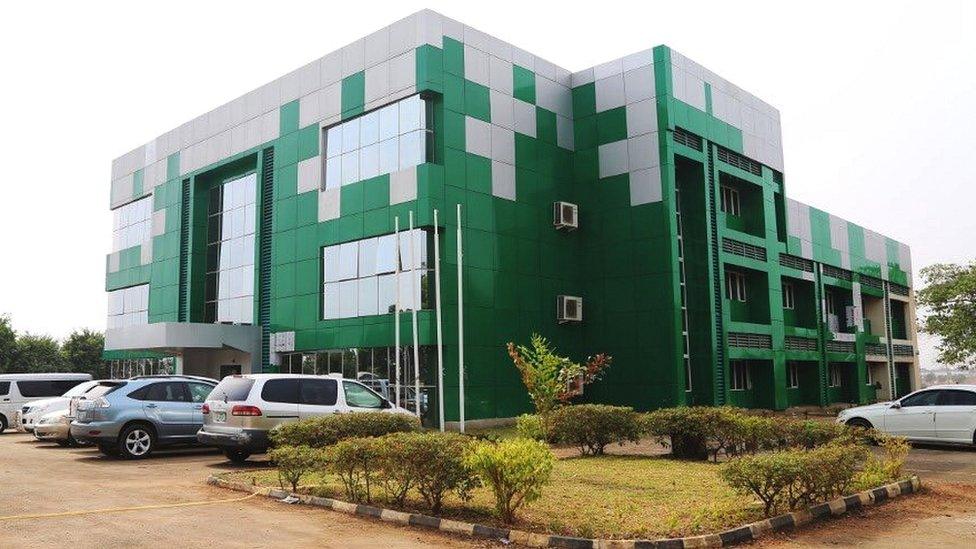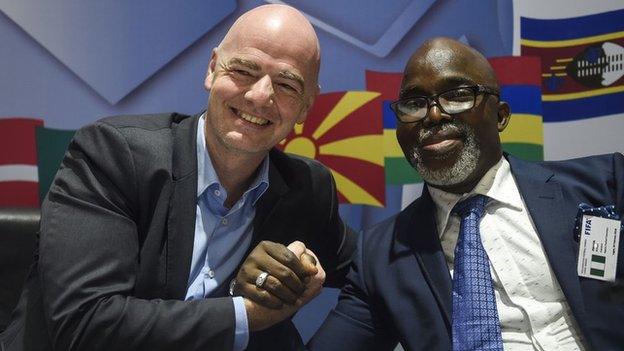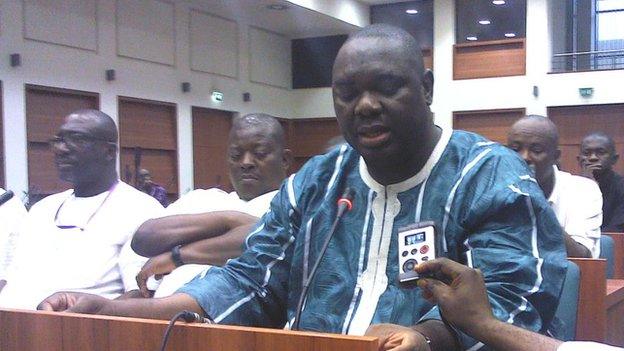Court case halts Nigerian football elections amidst bomb threat
- Published

This month's elections for the next president of Nigeria's Football Federation, based in Abuja, have been suspended
Elections for Nigeria's football federation (NFF) have been indefinitely postponed after the country's High Court issued an injunction against the polls, the recent subject of a bomb threat, because of an ongoing court case.
A court in the Nigerian capital, Abuja, issued the injunction two weeks' ahead of the proposed meeting in Benin City on 30 September.
The High Court ordered the NFF to suspend all poll-related activities because of a case brought against the governing body and its president Amaju Pinnick as well as the country's sports minister Sunday Dare.
The legal action involves a complaint by a body comprising two players' union factions seeking equal representation regarding voting rights within the NFF.
Adjourning until 31 October, Justice Inyang Ekwo ruled that the elections be put on hold until the court case is concluded.
When asked if the elections will be held this month in any case, Dare replied: "I've not really looked at the ruling, but we will be seeking a legal advice before making any comment."
Pinnick, who has ruled out re-election for a third term after taking office in 2014, has refused to comment about the development.
Bomb threat
Meanwhile, Dare's sports ministry is investigating a "faceless" group calling itself the Nigeria Football Stakeholders after it threatened to bomb the election venue in Benin City if the planned polls went ahead.
"The letter came to the ministry," a spokesperson for the sports ministry told BBC Sport Africa.
"It's such an unfortunate situation from this faceless group and the matter is being treated as very serious."
The group said that, because of the "atrocities committed by the current (NFF) board", the election should be "stopped till such a time when all reforms are carried out".
"Refusal to adhere to our warning will be met with very serious consequences," stated the letter. "We will not hesitate to bomb and bring down the venue of the election and blood will flow.
"Your agreement to the cancellation will save the lives that are supposed to be lost."
The sports ministry spokesperson told the BBC the letter, which comes against a backdrop of insecurity involving terrorist groups and bandits in Nigeria, has "been handed to the right authorities".
BBC Sport Africa understands that the letter, dated 7 August, was received by the sports ministry on 11 September, whereupon it was passed onto Nigeria's anti-terrorist forces.
Football matters in court

Amaju Pinnick (right), pictured with Fifa president Gianni Infantino, has led the NFF since 2014
Fifa disapproves of external interference in the running of a football association, having banned various countries including Kenya and Zimbabwe in the past for such an offence, so it remains to be seen how the game's global governing body will react to this latest move.
There is no clarity about why the court order surfaced with 15 days to the polls, but the swiftness of the injunction prompted one of the 11 candidates for the NFF presidency to declare it "a well-orchestrated move by those not willing to hand over power".
While current members of the NFF board prefer the current 44-member elective congress, other stakeholders have been pushing to revert to 101 members.
They argue the enlarged tally could include representatives of the country's professional and amateur football clubs, journalists, referees, armed forces and coaches.
Endless circle
The NFF elections are no strangers to their occurrence being derailed by a variety of incidents, with court injunctions, political shenanigans and orchestrated putsches having all blighted the quadrennial polls since 2006.
Ibrahim Galadima, who took the reins as NFF president in 2002, was re-elected in a Fifa-endorsed congress, external in 2006 but was thrown out of office, external later that year during an extraordinary congress in Abuja.
Sani Lulu controversially replaced, external Galadima in August 2006, before Lulu himself was impeached, external after a poor 2010 World Cup.
Despite a court petition challenging the validity of the poll, Aminu Maigari, external was declared NFF president later that year. Initially removed by his board following allegations of financial wrongdoing, he was reinstated following a Fifa intervention.
Several problems arose in the build-up to the 2014 polls, but Amaju Pinnick was elected at the end September despite a court injunction purportedly granted to a group led by self-acclaimed NFF president Chris Giwa.

Chris Giwa was banned by Fifa in 2016, two years after claiming to have won NFF elections which the global body did not recognise
The latter challenged Pinnick's presidency for three years before he was banned by Fifa.
Pinnick continued to enjoy the backing of Fifa amid corruption allegations, before becoming the first person to win a second consecutive four-year term as NFF boss in 2018.
A member of the all-powerful Fifa Council, his attempt for a third term in office was rejected by his support base, prompting Pinnick to drop the idea of staying in power beyond 2022.